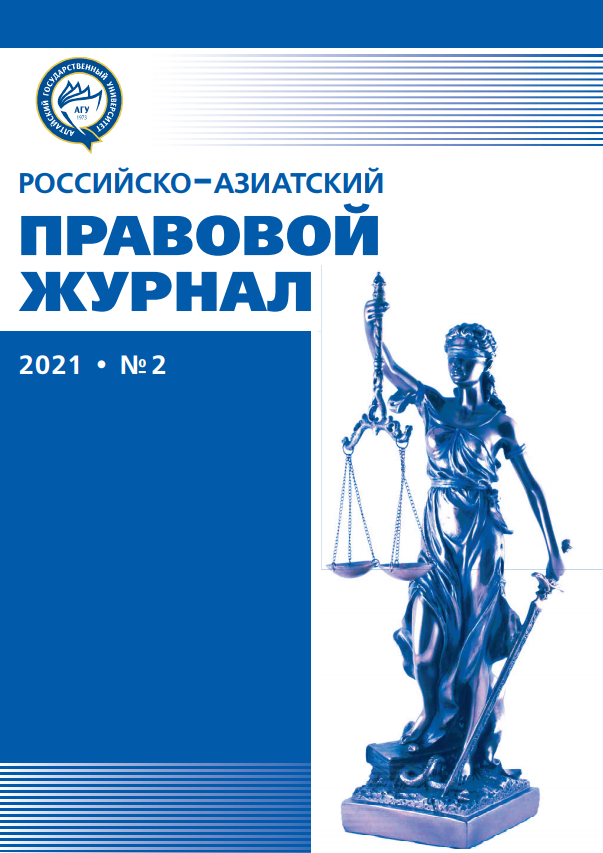THE PROBLEM OF DETERMINING THE LEGAL REGIME OF “DISPUTED” REAL ESTATE: THEORETICAL AND PRACTICAL ASPECTS
УДК 347.214.2 ББК 67.404.1
Abstract
The article raises the following topical problems currently inherent in the institution of real estate in theRussian Federation: the unsuccessful legal definition of a real estate object, enshrined in Art. 131 of the CivilCode of the Russian Federation; qualification of objects as immovable and, accordingly, delimitation of themfrom movable ones; the emergence of objects with a controversial legal regime; the need to move from themodel of “plurality” to the model of “unity” of real estate objects. Also, the authors of this article analyzea number of approaches aimed at resolving the above problems and the possible consequences (both positiveand negative) of their implementation in practice, put forward their views and offer their own solutionto these problems. A variant of the legalization of “disputable” objects is proposed by introducing the rightof construction into the civil law of the Russian Federation as a limited property right to use a land plot withthe extension of this right to everything that is being built on such a land plot. The examples of legislativeregulation of the right to build in the civil law of pre-revolutionary Russia are considered, the elements of theright to build in the current law of the Russian Federation are revealed.
Downloads
References
2. Алексеев В.А. Недвижимое имущество: правовой режим и государственная регистрация прав : дис. … д-ра юрид. наук. М., 2008.
3. Бевзенко Р.С. Земельный участок с постройками на нем: введение в российское право недвижимости. М., 2017.
4. Артельных И.В. Критерии, по которым суды оценивают, является объект движимым имуществом или относится к недвижимости // Российский налоговый курьер. 2013. №5.
5. Определение Верховного Суда РФ от 30.12.2015 №304-КГ15–8395 по делу № А67–8170/2012 // Сайт Верховного Суда РФ. URL: http://www.vsrf.ru (дата обращения: 04.10.2020).
6. О применении судами некоторых положений раздела I части первой Гражданского кодекса Российской Федерации : постановление Пленума Верховного Суда РФ от 23 июня 2015 г. N 25 // Сайт Верховного Суда РФ. URL: http://www.vsrf.ru (дата обращения: 04.10.2020).
7. Концепция развития гражданского законодательства о недвижимом имуществе// Консультант плюс : справочно-правовая система. Версия 2018.
8. Безик К. Самовольная постройка и концепция единого объекта недвижимости // Закон. ру. URL: https://zakon.ru/blog/2016/2/12/samovolnaya_postrojka_i_koncepciya_edinogo_obekta_ nedvizhimosti (дата обращения: 26.09.2020).
9. Бевзенко Р.С. Право недвижимости в 2018 году // Что интересного произошло в сфере права недвижимости в уходящем году? // Закон.ру. URL: https://zakon.ru/blog/2018/12/29/pravo_nedvizhimosti_v_2018_godu__chto_interesnogo_proizoshlo_v_sfere_prava_nedvizhimosti_v_uhodya ch(дата обращения: 26.09.2020).
10. О несостоятельности (банкротстве): Федеральный закон от 26 октября 2002 г. №127-ФЗ // Консультант плюс : справочно-правовая система. Версия 2021.
11. Дождев Д.В. Суперфиций и эмфитевзис. В чем специфика российского вещного права? // Postnauka.ru. URL: https://postnauka.ru/video/36715 (дата обращения: 26.05.2021).
12. Пронина Н.А. Суперфиций и право застройки: судьба юридических конструкций в историкоправовом контексте // Известия Алтайского гос. ун-та. 2016. №3.
13. О государственно-частном партнерстве, муниципально-частном партнерстве в Российской Федерации и внесении изменений в отдельные законодательные акты Российской Федерации : Федеральный закон от 13 июля 2015 г. №224-ФЗ // Консультант плюс: справочно -правовая система.Версия 2021.
Russian-Asian Law Journal is a golden publisher, as we allow self-archiving, but most importantly we are fully transparent about your rights.
Authors may present and discuss their findings ahead of publication: at scientific conferences, on preprint servers, in public databases, and in blogs, wikis, tweets, and other informal communication channels.
Russian-Asian Law Journal allows authors to deposit manuscripts (currently under review or those for intended submission) in non-commercial, pre-print servers such as ArXiv.
Authors who publish with this journal agree to the following terms:
- Authors retain copyright and grant the journal right of first publication with the work simultaneously licensed under a Creative Commons Attribution License that allows others to share the work with an acknowledgement of the work's authorship and initial publication in this journal.
- Authors are able to enter into separate, additional contractual arrangements for the non-exclusive distribution of the journal's published version of the work (e.g., post it to an institutional repository or publish it in a book), with an acknowledgement of its initial publication in this journal.
- Authors are permitted and encouraged to post their work online (e.g., in institutional repositories or on their website) prior to and during the submission process, as it can lead to productive exchanges, as well as earlier and greater citation of published work (See The Effect of Open Access).








